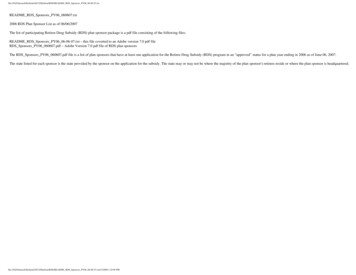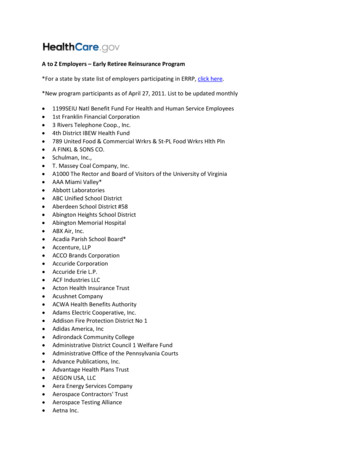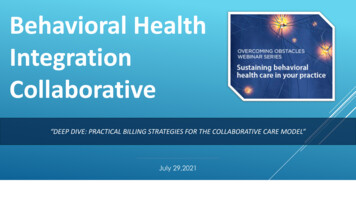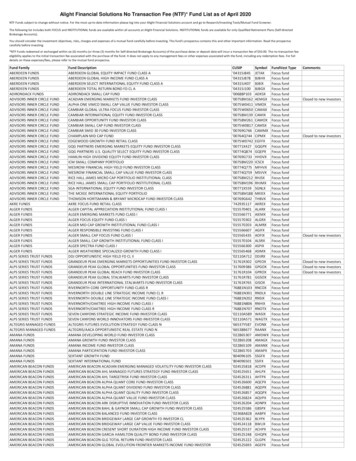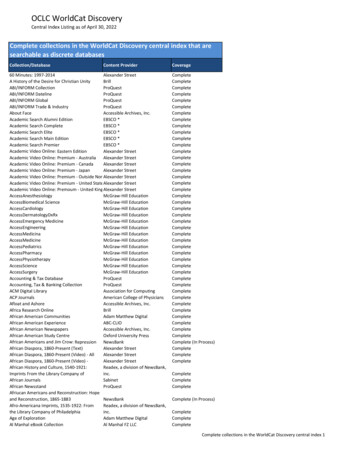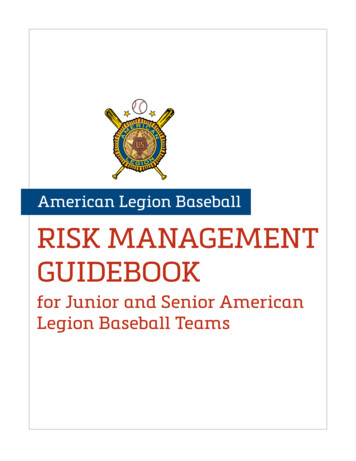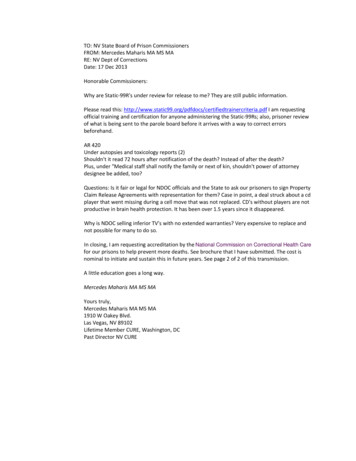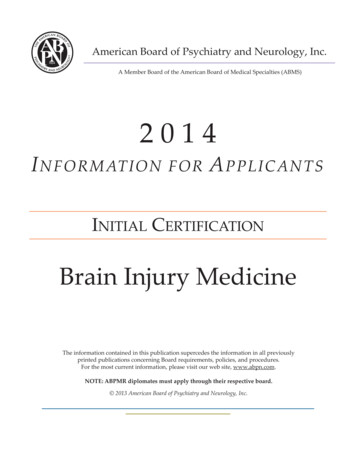
Transcription
Ramerican Board of Psychiatry and neurology, Inc.a Member Board of the american Board of Medical Specialties (aBMS)2014I NFORMATIONFORA PPLICANTSInITIal CerTIFICaTIonBrain Injury MedicineThe information contained in this publication supercedes the information in all previouslyprinted publications concerning Board requirements, policies, and procedures.For the most current information, please visit our web site, www.abpn.com.NOTE: ABPMR diplomates must apply through their respective board. 2013 American Board of Psychiatry and Neurology, Inc.
RaBPn2014 Initial Certification in Brain Injury MedicineExamination Fee Schedule(Pertaining only to the 2014 examination date choices listed below)Date ChoicesOctober 6, 2014Application DeadlineJanuary 15, 2014Late DeadlineFebruary 14, 20142014 Fee Schedule*application fee . . . . . . . . . . . . . . . . . . . . . . . . . . . . . . . . . . . . . . . . . . . . . . . . . . 700examination fee . . . . . . . . . . . . . . . . . . . . . . . . . . . . . . . . . . . . . . . . . . . . . . . . . 1200Total fee . . . . . . . . . . . . . . . . . . . . . . . . . . . . . . . . . . . . . . . . . . . . . . . . . . . . . . . . 1900late application fee (in addition to the above). . . . . . . . . . . . . . . . . . . . . . . . . . 500reexamination fee**. . . . . . . . . . . . . . . . . . . . . . . . . . . . . . . . . . . . . . . . . . . . . . 1200application/licensure appeal fee***. . . . . . . . . . . . . . . . . . . . . . . . . . . . . . . . . 350examination appeal fee*** . . . . . . . . . . . . . . . . . . . . . . . . . . . . . . . . . . . . . . . . 300Irregular behavior appeal fee***. . . . . . . . . . . . . . . . . . . . . . . . . . . . . . . . . . . . 350application for testing accommodations appeal fee*** . . . . . . . . . . . . . . . . 350Duplicate certificate fee . . . . . . . . . . . . . . . . . . . . . . . . . . . . . . . . . . . . . . . . . . . 150returned check charge . . . . . . . . . . . . . . . . . . . . . . . . . . . . . . . . . . . . . . . . . . . 50**********All fees must be submitted in U.S. currency.Fee is non-refundable.Reexamination fees are in addition to any appeal fees.Appeal fees are refundable if the decision is in the appellant’s favor.Please Note: The ABPN reserves the right to revise fee schedules at any time. Throughout this publication, the American Board of Psychiatry and Neurology, Inc. may be referred to as “the Board” or as “ABPN.”american Board of Psychiatry and neurology, Inc., 2150 e. lake Cook road, Suite 900, Buffalo Grove, Il Ph: 847.229.6500 www.abpn.com
RaBPnImportant Dates for the 2014 Certification in Brain Injury Medicine ExaminationCertification in psychiatry, neurology,or child neurology requiredDecember 31, 2013Application deadlineJanuary 15, 2014Applications availableOctober 15, 2013Late application deadlineFebruary 14, 2014Applicant should contact the Boardif they have not received notificationregarding their applicationMarch 15, 2014Admission materials emailedApril 15, 2014Graduation verification due in Boardoffice for residents graduating June 30, 2014July 15, 2014Pearson VUE registration opensApril 15, 2014Brain Injury Medicine fellowshipcompletedJuly 31, 2014Brain Injury Medicine ExaminationOctober 6, 2014Graduation verification due in Boardoffice for residents graduating July 31, 2014August 15, 2014american Board of Psychiatry and neurology, Inc., 2150 e. lake Cook road, Suite 900, Buffalo Grove, Il Ph: 847.229.6500 www.abpn.com
RaBPn2014 Information for Applicants for Initial Certification in the Subspecialty ofBrain Injury MedicineSection I: General Information and Board PoliciesA. General Information . . . . . . . . . . . . . . . . . . . . . . . . . . . . . . . . . . . . . . . . . . . . . . . . . . . . . . . . . . . . . . . . . . . . . . . 11. History . . . . . . . . . . . . . . . . . . . . . . . . . . . . . . . . . . . . . . . . . . . . . . . . . . . . . . . . . . . . . . . . . . . . . . . . . . . . . . . . 12. Mission Statement . . . . . . . . . . . . . . . . . . . . . . . . . . . . . . . . . . . . . . . . . . . . . . . . . . . . . . . . . . . . . . . . . . . . . . . 13. Composition of the Board . . . . . . . . . . . . . . . . . . . . . . . . . . . . . . . . . . . . . . . . . . . . . . . . . . . . . . . . . . . . . . . . 14. Conflict of Interest. . . . . . . . . . . . . . . . . . . . . . . . . . . . . . . . . . . . . . . . . . . . . . . . . . . . . . . . . . . . . . . . . . . . . . . 15. Certificates . . . . . . . . . . . . . . . . . . . . . . . . . . . . . . . . . . . . . . . . . . . . . . . . . . . . . . . . . . . . . . . . . . . . . . . . . . . . . 2B. Board Policies . . . . . . . . . . . . . . . . . . . . . . . . . . . . . . . . . . . . . . . . . . . . . . . . . . . . . . . . . . . . . . . . . . . . . . . . . . . . . 31. rules and regulations . . . . . . . . . . . . . . . . . . . . . . . . . . . . . . . . . . . . . . . . . . . . . . . . . . . . . . . . . . . . . . . . . . . 32. licensure. . . . . . . . . . . . . . . . . . . . . . . . . . . . . . . . . . . . . . . . . . . . . . . . . . . . . . . . . . . . . . . . . . . . . . . . . . . . . . . 33. Maintenance of Certification (MoC) Program . . . . . . . . . . . . . . . . . . . . . . . . . . . . . . . . . . . . . . . . . . . . . . . 44. revocation of Certificates . . . . . . . . . . . . . . . . . . . . . . . . . . . . . . . . . . . . . . . . . . . . . . . . . . . . . . . . . . . . . . . . 55. Board eligibility. . . . . . . . . . . . . . . . . . . . . . . . . . . . . . . . . . . . . . . . . . . . . . . . . . . . . . . . . . . . . . . . . . . . . . . . . 56. review Courses . . . . . . . . . . . . . . . . . . . . . . . . . . . . . . . . . . . . . . . . . . . . . . . . . . . . . . . . . . . . . . . . . . . . . . . . . 57. Cancellation Policy . . . . . . . . . . . . . . . . . . . . . . . . . . . . . . . . . . . . . . . . . . . . . . . . . . . . . . . . . . . . . . . . . . . . . . 58. Policy regarding Medical or other emergencies. . . . . . . . . . . . . . . . . . . . . . . . . . . . . . . . . . . . . . . . . . . . . 59. Policy on Irregular Behavior, Including Unethical Behavior of Candidates . . . . . . . . . . . . . . . . . . . . . . 510. Policy regarding appeals . . . . . . . . . . . . . . . . . . . . . . . . . . . . . . . . . . . . . . . . . . . . . . . . . . . . . . . . . . . . . . . . 711. Policy for applicants with Disabilities and Qualifications for Testing accommodations . . . . . . . . . . . 7Section II: Training Information for Certification in Brain Injury MedicineA. General Training Requirements . . . . . . . . . . . . . . . . . . . . . . . . . . . . . . . . . . . . . . . . . . . . . . . . . . . . . . . . . . . .9B. Specific Requirements During the “Grandfathering Period”(2014 through 2018 Examinations) . . . . . . . . . . . . . . . . . . . . . . . . . . . . . . . . . . . . . . . . . . . . . . . . . . . . . . . . . . .9C. Training Pathway (Specific Training Requirements after the “Grandfathering Period”- After 2018) . . . . . . . . . . . . . . . . . . . . . . . . . . . . . . . . . . . . . . . . . . . . . . . . . . . . . . . . . . . . . . . . . . . . . . . . . . . . .10Section III: Requirements for Admission to Certification inBrain Injury Medicine ExaminationsA. General Requirements for All Applicants . . . . . . . . . . . . . . . . . . . . . . . . . . . . . . . . . . . . . . . . . . . . . . . . . .11B. Initial Certification in the Subspecialty of Brain Injury Medicine . . . . . . . . . . . . . . . . . . . . . . . . . . . .11C. Application Process Information . . . . . . . . . . . . . . . . . . . . . . . . . . . . . . . . . . . . . . . . . . . . . . . . . . . . . . . . . .11A.B.C.D.Section IV: Certification in Brain Injury Medicine ExaminationsProcedures, Format, and ContentComputer-Administered Examination Procedures . . . . . . . . . . . . . . . . . . . . . . . . . . . . . . . . . . . . . . . . . .13Brain Injury Medicine Examination Format and Content . . . . . . . . . . . . . . . . . . . . . . . . . . . . . . . . . . . .14Grade Letters and Certificate Mailings . . . . . . . . . . . . . . . . . . . . . . . . . . . . . . . . . . . . . . . . . . . . . . . . . . . .15Computer-Administered Examinations Appeals Procedures . . . . . . . . . . . . . . . . . . . . . . . . . . . . . . . . .151. appeals Procedure for rejection of Credentials, Invalidation of examination ScoreDue to Irregular Behavior, or Denial of a request for Disability accommodations . . . . . . . . . . . . . .152. appeals Procedure for Computer-administered examination Failing Grade Due to theAdministration of the examination . . . . . . . . . . . . . . . . . . . . . . . . . . . . . . . . . . . . . . . . . . . . . . . . . . . . . . . .15american Board of Psychiatry and neurology, Inc., 2150 e. lake Cook road, Suite 900, Buffalo Grove, Il Ph: 847.229.6500 www.abpn.com
RaBPnSection I: General Information and Board PoliciesA. General Information1. HistoryThe american Board of Psychiatry and neurology, Inc. (aBPn), the Board, is a nonprofit corporation that was founded in 1934following conferences of committees appointed by the american Psychiatric association (aPa), the american neurologicalassociation, and the then Section on nervous and Mental Diseases of the american Medical association. This action was takenas a method of identifying qualified specialists in psychiatry and neurology.2. Mission StatementThe mission of the american Board of Psychiatry and neurology, Inc. is to develop and provide valid and reliable proceduresfor certifications and maintenance of certification in psychiatry and neurology by: Communicating and collaborating effectively with training programs, residents, candidates, diplomates, professionalorganizations, and the public; applying the best technologies and information available to collect and analyze pertinent data; Developing the best testing methods to evaluate candidate and diplomate competencies; and operating programs and services efficiently.Methods for achieving that goal include but are not limited to efforts to:a. Describe, in terms of knowledge and skills, a physician with special expertise in evaluation, diagnosis, and treatment ofpatients with psychiatric and/or neurologic disorders or who require psychiatric and/or neurologic assessment.b. Set the standards for knowledge and skills required for certification.c. Construct and administer examinations designed to evaluate required knowledge and skills.d. Monitor, evaluate, and improve the standards and procedures of the certification process.e. Participate in the appropriate residency review Committees of the accreditation Council for Graduate Medicaleducation (aCGMe) to set standards for the quality and scope of residency training programs to ensure that theirgraduates will obtain necessary training credit toward certification.f. Issue certificates and other forms of recognition to successful candidates.g. Make lists available of diplomates who have fulfilled the requirements for certification.h. Inform the public, other professions, and other medical organizations of the purposes, activities, and responsibilities ofthe Corporation.i. Participate in the activities of the american Board of Medical Specialties (aBMS) and its member Boards.3. Composition of the BoardThe Board is independently incorporated and consists of 16 voting members. elections to fill the places of Directors whoseterms have expired take place annually. neurology and psychiatry are always represented equally on the Board. The Boardholds meetings each year for the purpose of transacting business.4. Conflict of InterestThe Board maintains a rigorous conflict of interest policy. as such, to maintain the confidence of the public and the medicalprofession in the integrity of the Board, it is important for those doing its work to avoid certain activities that could provideopportunity for a conflict of interest or the appearance thereof. a conflict of interest is defined as an instance wherein acompeting outside activity or holding could influence or appear to influence the Board’s activities in the area of policydevelopment, evaluation of training programs, or examination development.no Board member shall participate in any discussion or vote on any matter in which he or she (or a member of his or herimmediate family) has a conflict of interest. all board employees and officers shall avoid all conflicts and disclose all potentialconflicts between their respective personal, professional or business interests and the interests of the Board.as an alternative to regulating investment or employment, the Board has chosen to manage matters related to the appearance ofa conflict of interest by encouraging disclosure of significant financial interests or relationships and abstention fromparticipation in decision-making related to a matter that could give rise to a conflict of interest (due to a material financialinterest or relationship).american Board of Psychiatry and neurology, Inc., 2150 e. lake Cook road, Suite 900, Buffalo Grove, Il Ph: 847.229.6500 www.abpn.com1
RaBPnannually, Board members, test committee members, written examination proctors, the President and Ceo, and staff membersof the Board are required to complete a form disclosing informational conflicts and potential conflicts of interest.any individual who participates in any review course that is publicized as being a board review course, or in any course thatcould be construed as a board review course, or who has edited or provided written or audiovisual materials for publicationsidentified as preparation for Board examinations, or who copies, reproduces, or discloses examination materials or contentshould not participate as an examiner in any oral examination, as a proctor in any written examination, or as a member of anyBoard committee for at least 12 months subsequent to the course or publication of any written or audiovisual materials.all aBPn Board members and all aBPn examiners are diplomates of the aBPn.5. CertificatesThe Board currently issues certificates for the following specialties: Psychiatry neurology neurology with Special Qualification in Child neurologyThe Board also currently issues certificates for the following subspecialties: addiction Psychiatry Hospice and Palliative Medicine Brain Injury Medicine neurodevelopmental Disabilities Child and adolescent Psychiatry neuromuscular Medicine Clinical neurophysiology Pain Medicine epilepsy Psychosomatic Medicine Forensic Psychiatry Sleep Medicine Geriatric Psychiatry Vascular neurology Hospice and Palliative Medicinea physician may be certified in more than one area and will receive a separate certificate for each area in which he or shequalifies. each certificate shall be in such form and for such period of time as specified by the Board.The purpose of the aBPn’s initial certification examinations is to test the qualifications of candidates in psychiatry, neurology,or both. as these medical disciplines constitute part of the broad field of general medicine, the Board requires proficiency inneurology on the part of those it certifies in psychiatry and vice versa, but examines the candidate in accordance with thecertificate he or she seeks. each examination shall cover such subjects as the Board may determine.american Board of Psychiatry and neurology, Inc., 2150 e. lake Cook road, Suite 900, Buffalo Grove, Il Ph: 847.229.6500 www.abpn.com2
RaBPnB. Board Policies1. Rules and RegulationsIn carrying out its specified functions, the Board has formulated rules and regulations to guide its activities and tocommunicate to applicants and other interested persons its policies regarding training requirements, examinations, fees,etc. These rules and regulations are amended from time to time. The statements contained in this publication are the mostrecent amendments and represent the policies of the Board as of the date of this publication. Visit www.abpn.com for themost current information. The Board has authority to periodically issue and thereafter to amend the rules and regulationsrelating to the issuance and revocation of certificates of qualification in the practice of psychiatry, neurology, childneurology, and the recognized subspecialties.The Board may conduct examinations at such times and places as it deems appropriate. The Board reserves the right tolimit the number of candidates admitted to any scheduled examination. The administration and grading of all examinationsshall be at the sole discretion of the Board.With the publication of the Diagnostic and Statistical Manual of Mental Disorders, Fifth edition (DSM-5), the americanBoard of Psychiatry and neurology (aBPn) will adapt its examination specifications and content to conform to DSM-5classifications and diagnostic criteria for its computer-delivered certification and maintenance of certificationexaminations according to the following timeline:examinations administered in 2013 and 2014Will continue to use DSM-IV-Trexaminations administered in 2015 and 2016Will use classifications and diagnostic criteria that have not changed from DSM-IV-Tr to DSM-5examinations administered in 2017Will use DSM-5 classifications and diagnostic criteriaoral examinations will continue to conform to DSM-IV-Tr.2. LicensureSubject to the exceptions noted below, throughout the certification and maintenance of certification processes, and inorder to maintain a valid certificate and aBPn Diplomate status, physicians must hold an active, full, and unrestrictedallopathic and/or osteopathic license to practice medicine in at least one state, commonwealth, territory, or possession ofthe United States or province of Canada. If licenses are held in more than one jurisdiction, all licenses held by thephysician must be full and unrestricted to meet this requirement. an active, full, and unrestricted medical license must bemaintained even if a physician is out of the country for extended periods of time.an unrestricted medical license is a license to practice medicine that has been issued by an appropriate and authorizedlicensing board and contains no restrictions on the physician's privilege to practice professionally. restrictions include butare not limited to any disciplinary action, revocation, cancellation, suspension, condition, agreement, stipulation,probation, forfeiture, surrender, plea agreement, settlement agreement, failure to renew, prohibition against applying,lapse, inactive status or contingency in any way relevant to a license and/or the physician's privilege to practiceprofessionally that resulted from or is based on personal or professional misconduct, professional ethics, moral turpitude,criminal charges, indictments and/or convictions, and professional incompetence and/or malpractice.a diplomate who no longer meets the Board's licensure requirements shall, without any action necessary by the Board orany right to a hearing, automatically lose his or her diplomate status in all specialties and subspecialties for which theindividual has received a certificate from the Board, and all such certificates shall be invalid.a physician in possession of any restricted medical license, even if the physician also possesses an unrestricted license,will not be scheduled for examination, be issued a certificate, be authorized to be in possession of a certificate, or beallowed to represent himself or herself as an aBPn-certified physician.american Board of Psychiatry and neurology, Inc., 2150 e. lake Cook road, Suite 900, Buffalo Grove, Il Ph: 847.229.6500 www.abpn.com3
RaBPnIt is the obligation of the candidate/diplomate to inform the Board immediately upon any change in licensure status.Exceptions: restriction of a physician's medical license does not include voluntary participation in an impairedphysicians' program or other appropriate, monitored alcohol or chemical substance-abuse recoveryprogram if the physician has NOT been reported to either the national Practitioner Data Bank or the DataBank of the Federation of State Medical Boards. restriction of a physician's medical license does not include medical licenses that, when issued, are limitedto a geographic area within a jurisdiction (e.g., practice limited to under-served areas), as long as suchlicenses are not in anyway limited due to, because of, or by virtue of a disciplinary, legal, or administrativeaction against the license holder.at its sole discretion, the Board may review instances of licensure restrictions to determine whether suchrestrictions constitute a violation of the Board's licensure requirements.applicants who do not yet have an unrestricted medical license because they are in training are not required tosubmit a copy of their medical license at the time of application for the Certification examination. However, suchapplicants must submit a copy of their active, full, unrestricted medical license, showing the expiration date, nolater than the date specified in the Requirements for Admission section of the appropriateINFORMATION FOR APPLICANTS publication. applicants holding more than one license must submit a copy of eachlicense.3. Maintenance of Certification (MOC) ProgramThe aBPn MoC Program reflects the Board’s commitment to lifelong learning throughout one’s profession. The mission of theaBPn's Maintenance of Certification (MoC) Program is to advance the clinical practice of psychiatry and neurology bypromoting the highest evidence-based guidelines and standards to ensure excellence in all areas of care and practiceimprovement. The MoC program requires diplomates to participate in sanctioned self-assessment performance measures,identify perceived weaknesses in their knowledge, pursue learning activities tailored to areas that need to be strengthened, anddevelop quality improvement programs based on their clinical practice. The goal is for diplomates to reflect on their personalknowledge and performance and commit to a process of improvement and reevaluation of performance measures over aspecified time frame that will ultimately lead to improved care for their patients.Diplomates are responsible for choosing their own self-assessment activities, continuing education credits, and practice improvement plans, and they can choose the learning tools that will best address their perceived needs, expand their expertise,and enhance the effectiveness and efficiency of their practice. Beginning in 2014, diplomates are required to use only ABPNapproved products for self-assessment and performance in practice activities. A list of ABPN approved maintenance of certification products is available at www.abpn.com/moc-productsPhysicians who are certified in both psychiatry and neurology and who desire to maintain their certificates in both disciplinesmust only meet the CMe, Self-assessment, and Performance in Practice (PIP) requirements for one specialty. However, they willbe required to pass cognitive examinations in both psychiatry and neurology.Diplomates with certificates in the subspecialties of addiction psychiatry, brain injury medicine, clinical neurophysiology,epilepsy, forensic psychiatry, geriatric psychiatry, hospice and palliative medicine, neuromuscular medicine, pain medicine,psychosomatic medicine, sleep medicine, and vascular neurology must also maintain certification in their specialty in order toapply for recertification in the area of subspecialization. Diplomates in neurodevelopmental disabilities must maintain certification in neurology with special qualification in child neurology. If certification in the specialty lapses, certification in the subspecialty is no longer valid.Diplomates in child and adolescent psychiatry do not need to maintain current certification in general psychiatry for their subspecialty certification to remain valid and to recertify in child and adolescent psychiatry.There is no time limit on regaining certification status through maintenance of certification. It is the responsibility of diplomatesto obtain application materials for maintenance of certification. Information for Applicants publications are available to downloadfrom www.abpn.com.american Board of Psychiatry and neurology, Inc., 2150 e. lake Cook road, Suite 900, Buffalo Grove, Il Ph: 847.229.6500 www.abpn.com4
RaBPnThe ABPN encourages all diplomates to update their Clinical Activity Status through ABPN Physician Folios atwww.abpn.com/foliosNOTE: All policies, components, and requirements of the ABPN’s Maintenance of Certification (MOC) Program are subject tochange. It is the responsibility of each individual ABPN diplomate to remain apprised of the current applicable MOC Program.As such, diplomates are encouraged to consult the ABPN’s website www.abpn.com, regularly to ascertain whether any changeshave been made.as mandated by the american Board of Medical Specialties, the Board has developed a Maintenance of Certification (MoC)program that includes four components:1. Professional Standing;2. Self-assessment and CMe;3. Cognitive expertise;4. Performance in Practice.Participation in the MoC program includes meeting all MoC requirements, not just passing the MoC cognitive examination.An active, full, unrestricted license must be maintained even if the physician is out of the country for extended periods oftime.4. Revocation of CertificatesThe Board has the authority to revoke any certificate issued by it for cause or to place a certificate holder on probation for afixed or indefinite period of time.5. Board EligibilityThe aBPn does not recognize or use the term “Board eligible” and does not issue statements concerning “Board eligibility.” TheBoard informs an applicant of admissibility to examination only when the applicant has an active, approved application on filein the Board office. effective January 1, 2012, aBPn will require a physician to become Board certified within seven years following successfulcompletion of aCGMe-accredited or aBPn approved residency training in their primary specialty or aCGMe-accreditedsubspecialty.Graduates can take the aBPn Certification examination as many times as allowed during the seven-year period.Individuals who have completed an accredited residency program prior to January 1, 2012 will have until January 1, 2019to become board certified.Individuals who do not become certified during the seven-year period (or before January 1, 2019 for those who completedresidency training before January 1, 2012) will be required to (1) repeat the required clinical skills evaluations; and (2)complete one stage of MoC (90 CMe credits, 24 self-assessment CMe credits, and one PIP Unit that includes a clinical andfeedback module) in order to be credentialed to take the aBPn Certification examination.6. Review CoursesThe Board does not endorse or recommend any texts or other teaching aids identified as “board preparation” material.Furthermore, neither the Board nor any of its committees has any affiliation with or responsibility for programs identifyingthemselves as “board review courses.”7. Cancellation PolicyThe Board is not liable for candidate travel and/or other related expenses incurred as a result of the cancellation of anexamination.8. Policy Regarding Medical or Other EmergenciesThe Board requires candidates to sit for examinations for which they have applied and/or are scheduled. The Boardacknowledges that unforeseen medical or other emergencies may prevent candidates from sitting for examinations to whichthey have applied and/or are scheduled.9. Policy on Irregular Behavior, Including Unethical Behavior of CandidatesThe Board believes that the ethics, conduct, and behavior of its diplomates and candidates for certification are relevant andimportant. The following rules apply:american Board of Psychiatry and neurology, Inc., 2150 e. lake Cook road, Suite 900, Buffalo Grove, Il Ph: 847.229.6500 www.abpn.com5
RaBPn1. Submission of false and/or fraudulent credentials or application information is impermissible. any physician whoobtains, attempts to obtain, or assists another person to obtain certification, recertification, or maintenance of certificationby deceptive means, including but not limited to submitting or assisting another person to submit to the Board anyapplication, credential, licensure information, or other information or documentation that contains a material misstatement,misrepresentation, or omission will be deemed to have violated this rule. any physician who violates this rule will besubject to all available disciplinary actions, including but not limited to legal action by the Board, certificate revocation,invalidation of examination results, and/or will be cause for the Board's refusal to admit a candidate to examination for upto five years.2. Physicians must accurately represent their certification status at all times. This includes descriptions in curriculumvitae, advertisements, publications, directories, business cards, letterheads, and oral representations. Diplomates withexpired time-limited certificates may not claim Board certification and must revise all descriptions of their qualificationsaccordingly. Physicians may not manufacture, modify, reproduce, distribute, or use fraudulent or otherwise unauthorizedaBPn certificates or other documents; falsely claim to be certified by the aBPn; misrepresent their aBPn certificate status;otherwise use aBPn certificates or other documents in violation of trademark and/or copyright laws; or assist another to doany of the above. any physician who violates this rule will be subject to all available disciplinary actions, including but notlimited to legal action by the Board, certificate revocation, invalidation of examination results, and/or will be cause for theBoard's refusal to admit a candidate to examination for up to five years.3. The performance of all physicians taking an examination will be monitored. Test center personnel wil
all aBPn Board members and all aBPn examiners are diplomates of the aBPn. 5. Certificates The Board currently issues certificates for the following specialties: Psychiatry neurology neurology with Special Qualification in Child neurology The Board also currently issues certificates for the following subspecialties:
